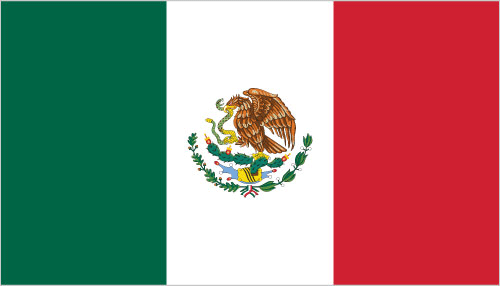
Mexico
The New World of Foreign Direct Investment
1 . After more than a half century of increasingly liberalized world trade, there are signs of change. Do you see world trade patterns evolving in new and different directions? What does this mean for your country and your clients?
There are certainly signs of change in world trade and the patterns we see evolving are clearly in one direction — a number of countries who have been firm believers in globalization and liberalization of tariffs and trade barriers, are now shifting to a more nationalistic and close economy approach. Fortunately, in the case of Mexico there has not been significant change on trade policies, since Mexico has entered into 14 trade agreements with 50 countries, 30 agreements for the promotion and reciprocal protection of investment, and other commercial and cooperation agreements that provide Mexican exporters and foreign investors in Mexico free trade access to more than 81 countries. A clear example of this is the United States–Mexico–Canada Agreement (USMCA), which represents the largest free trade zone of the world, representing 16% of world trade, with access to a population of approximately 500 million people in the 3 member countries, producing goods and services of approximately USD 27,810 billion per year and representing approximately 16.8% of the annual GDP worldwide.
2 . Historically, foreign direct investment was embraced by governments as a way to strengthen domestic economies. Has your country’s government adopted an aggressive posture in regulating foreign investors?
Foreign direct investment still represents a solid pillar for the Mexican economy. Mexico receives approximately USD 30 billion of foreign direct investment per year (see https://data.worldbank.org/indicator/BX.KLT.DINV.CD.WD?locations=MX).
The Foreign Investment Law which regulates foreign investment, was enacted on December 27, 1993 and has not suffered substantial modifications since then. The only area where the Mexican government has taken an aggressive posture, is an attempt to modify certain regulations regarding energy and automotive production which are questionable under the USMCA, as well as the Mexican constitution. However, the position of the current administration is to continue relying heavily on foreign investment to solidify the Mexican economy, to remain attractive to foreign investment and profit from certain geopolitical circumstances (such as the potential US-China trade conflict), which represent opportunities for Mexico to promote “nearshoring” for US and Canadian manufacturers to establish or solidify their presence in Mexico.
3 . Are there specific sectors of your country’s economy or industries where foreign direct investment is barred or highly regulated?
In general terms, Mexico is a country widely open for foreign investment. There are some activities that are reserved to the Mexican government and Mexican investors, as well as some others where foreign investment is limited to percentages ranging from 10% to 49%, or where the prior approval of the Commission of Foreign Investments is required.
The following are a few examples of limitations or restrictions for foreign investment in Mexico:
- Restricted to Mexican investment: ground freight transportation (except for parcel service), ground passenger and tourism transportation.
- Highly regulated: 10% Co-ops (Cooperative societies), 49% in companies manufacturing arms, explosives, munition and cartridges, press and publication of newspapers for national distribution, etc.
4 . The global supply chain has been collapsing worldwide since 2020. How has this impacted businesses in your country and what steps has your country’s government taken to respond?
The global supply chain collapse has taken its toll on many aspects of manufacturing activities and in the Mexican economy (as a prime manufacturing location).
The most tangible impact was the shipping costs of the raw materials used in manufacturing industries. With the COVID-19 pandemic many international ports were shut down or reduced their operational hours, hence limiting the shipping of products to Mexico. This produced a higher operational cost, shortage of raw materials and ultimately a higher demand of goods negatively impacting the final price of the goods.
Although some Mexican industries could absorb the increased costs, others passed that higher expense on to the final consumers and others closed down operations (it is considered that approximately 1,010,857 Mexican business shut down operations in 2020, see https://inegi.org.mx/contenidos/saladeprensa/boletines/2020/OtrTemEcon/ECOVID-IE_DEMOGNEG.pdf).
This supply chain disruption also impacted retail companies. Even when the Mexican industry boasted of manufacturing plants of different industries, some of the products manufactured in Mexico are exportation only products (as of August 30, 2022, there were 6,033 maquiladora companies, which are somehow prevented from selling their products within the domestic market), thus reducing the volume of goods available for the domestic market.
Unfortunately, the Mexican Federal government did little to respond to the supply chain collapse, at least not during the peak of the pandemic and ultimately not until 2022.
On May 4, 2022, the Ministry of Finance and Public Credit published a series of government actions to try to control and prevent inflation and the shortage of products (known in Spanish as “PACIC”) (see https://www.gob.mx/presidencia/documentos/paquete-contra-la-inflacion-y-la-carestia-pacic).
Through PACIC the government implemented certain actions focused on:
- the agricultural sector (i.e. fixing fuel prices, waiving payment of antidumping duties upon importation of fertilizers, etc.);
- local transportation of products (i.e. maintaining toll fees and railroad interconnection costs at current prices);
- customs and customs clearance (i.e. expedite the customs clearance of goods imported/exported through maritime ports, borders and inland customs, increase the number of customs officials and create automated lanes);
- reduction of import duties for food products and raw materials used in the food industry (i.e. 6 months exemption of import duties upon importation of 21 basic goods for consumption and 5 strategic raw materials for that same industry).
The above measures were not sufficient to reduce inflation in Mexico. Based on information from the OECD, Mexico´s total inflation less food and energy is 6.3%; total inflation is 8.7%, and food inflation is 14.2% (see https://data.oecd.org/price/inflation-cpi.htm).
On July 20, 2022, the Ministry of Economy published a Joint Declaration on Cooperation of Global Supply Chain on its official website (see https://www.gob.mx/se/prensa/declaracion-conjunta-sobre-cooperacion-en-cadenas-de-suministro-globales?idiom=es). Through this declaration the Mexican government recognizes the importance of the supply chain, acknowledges the challenges faced globally and agreed to follow some principles to strengthen future global supply chain. Nonetheless, the government did set up immediate actions.
5 . In M&A transactions as well as joint ventures in your country, what are the most critical issues foreign investors must evaluate prior to contemplating a transaction?
Aside from business, market strategy and financial considerations, the most critical issues foreign investors must assess from the legal point of view, with respect to the potential target or joint venture partner, are:
- Foreign investment restrictions. As mentioned in Question 3 above, Mexico is a country widely open for foreign investment, but there are some activities reserved to the Mexican government and Mexican investors. The Mexican Foreign Investment Law contemplates alternatives of "neutral investment" vehicles where foreign investors may participate in restricted economic areas, provided that non-voting and non-controlling rights are given to those investors, and subject to prior approval from the Ministry of Economy.
- Pre-merger/antitrust clearance requirements. Based on certain thresholds focused on the value of the transaction, the assets, the stock and/or the sales of the parties involved, a transaction could require approval from the Federal Economic Competition Commission and/or the Federal Telecommunications Institute (depending on the markets involved). In case that the relevant transaction exceeds any of the thresholds contemplated by the Economic Competition Federal Law, the transaction may not be closed until the relevant antitrust clearance has been issued; otherwise, the parties could be subject to important economic sanctions (gun-jumping).
- Tax considerations. Depending on the type of transaction (stock vis-a-vis asset acquisition, or joint venture), tax residency of the parties involved, type of industry and assets, business plan for the intended transaction, prior legal and tax contingencies involving the target, among other considerations, an appropriate tax assessment must be made to implement the most efficient and appropriate structure for the intended transaction. Also, the evaluation of potential tax liabilities of the target is one of the most sensitive topics to be addressed during the due diligence process.
- Labor matters. Employment and labor laws in Mexico are protective of employee’s rights, which are considered of public order and may not be waived. Therefore, it is critical to consider the status of the labor relationships of the target, and carry out a thorough due diligence on employment, labor union and social security matters. It is also critical to design and prepare a plan for a soft transfer of labor relationships or change of control depending on the type of transaction to be implemented.
- Other critical issues. There is no "one-size fits-all" for M&A and joint venture transactions. Depending on the industry involved, background of the parties, type of transaction and corporate structure to be implemented, assets and business to be acquired, in addition to those topics listed above, there are other topics that may be critical, such as: legal title and absence of liens or third party rights, intellectual property and information technology matters, location of the business, real estate and environmental topics, availability of infrastructure for the project, financial liabilities, anti-money laundering and anticorruption compliance, foreign trade and customs matters, ESG compliance, regulatory requirements, existing litigations, relationships with customers, suppliers, distributors, government and other parties, among other matters. Therefore, a custom-made due diligence process must be carried out to identify material contingencies, pre-closing conditions and closing logistics for the transaction, as well as other important provisions of the M&A or joint venture agreement, such as representations and warranties, covenants, indemnification provisions, applicable jurisdiction and dispute resolution provisions.
6 . What is the best strategy for acquiring interests in real estate or other tangible property in your country? Is this more difficult for foreign investors?
The best strategy for acquiring interest in real estate is through the direct purchase of the property. Nonetheless, the use of other legal vehicles may result in certain tax benefits for the purchasing individuals or entities.
Pursuant to the Foreign Investment Law in Mexico, except for properties located within the “restricted zone”, the general rule is that there are no limitations to foreign investment of foreign individuals, foreign entities, or Mexican entities with foreign investment for the acquisition of real estate interest.
The restricted zone is 100km from the Mexican northern and southern border line, and 50km from the coastline of the country.
When an individual or entity foreign investor desires to acquire a property within the restricted zone for residential purposes, it may only do so through the incorporation of a special purpose trust which will have a maximum duration of 50 years term.
On the other hand, a Mexican company with foreign investment may directly acquire (without the trust structure) a property within the restricted zone, as long as:
- the corporate purpose of the entity requires the acquisition of a property;
- the property will not be used for residential purposes; and
- secures a permit from the Mexican Foreign Affairs Ministry.
If real estate is not located within the restricted zone, then foreign investors can acquire it directly prior to receiving authorization of the Mexican Foreign Affairs office, in the understanding that foreigners shall abide to the constitutional provisions and accept to be treated as Mexican nationals, therefore, renouncing to the protection of foreign government in case of a dispute over the property.
7 . What laws or regulations exist in your country to protect data exchange and privacy, and is the protection of intellectual property challenging for foreign investors?
The protection of personal data is a fundamental right recognized by the Mexican Constitution since 2009. Following this recognition, several laws, regulations and guidelines have been enacted to regulate data exchange and privacy within both, the public and private sectors.
Private Sector
Private entities and Individuals processing personal data from individuals are subject to the Federal Law for the Protection of Personal Data Held by Private Parties (2010), its Regulations (2011), and the Guidelines on Privacy Notices issued by the National Institute for Access to Information and Protection of Personal Data (INAI) (2013). These regulations comprise the main legal framework for the private sector.
Public Sector
Federal, State, and local authorities processing personal data from individuals are subject to the Federal Law for the Protection of Personal Data Held by Obliged Subjects (2017), the General Guidelines for the Protection of Personal Data for the Public Sector (2018), as well as local laws and regulations addressing authorities of each state of Mexico.
The protection of Intellectual Property in Mexico is not challenging at all for foreign entities or individuals. In fact, it is common practice within Mexican or foreign entities doing business in Mexico to protect trademarks, patents, copyrights, and plant varieties.
Furthermore, Mexico has solid institutions protecting intellectual property rights, such as the Mexican Institute of Industrial Property (patents and trademarks); National Copyright Institute (copyrights); and the National Service of Seed Inspection and Certification that are in charge of the registration and enforcement of IP rights over plan varieties.
In addition, Mexico has specialized laws for IP matters, and is also part of the most relevant International Treaties related to Intellectual Property, therefore, not only is the registration fairly regulated, but also there are important aspects to enforcing IP rights in Mexico.
The Intellectual Property system in Mexico follows international standards, regarding the prosecution for obtaining registrations, thus foreign investors will find that the requirements and timelines are similar to countries as the US or the European Community.
8 . Describe the most common legal structures used by foreign investors when doing business in your country.
The most common structures implemented by foreign investors doing business in Mexico are the following:
- Mexican companies (with full participation of foreign shareholders);
- branch offices of the foreign company; and, depending on the type of business
- Mexican trust with full benefits to foreign investors.
The most common type of corporate vehicles in Mexico are:
- S.A. de C.V. or its modality, S.A.P.I. de C.V. This entity shares similarities with a Corp. in the USA and is the type of company chosen when the entity needs to implement corporate governance rules, directors and managers structure, shareholders agreements and obligations (e.g., for a Joint Venture project) and attract investment from third parties. This entity is a limited liability company, and except for certain matters, the shareholders are not liable for the obligations and risks of the company. Unless there is an exception because of the industry or sector, the tax regime of the S.A. de C.V. and the S.A.P.I. de C.V. is exactly the same as the one of the S. de R.L. de C.V.
- S. de R.L. de C.V. This Mexican entity is similar to an LLC. It offers protection to the partners regarding liabilities of the company, but it does not require a complex corporate structure. This structure is not recommended when the intention of the business is to attract investors or implement shareholding rules and agreements. When the holding company is an LLC, and such company has elected to “Check the box” for tax purposes, the income deriving from the S. de R.L. de C.V. can be taxable for the individual owners of the LLC.
- S.C. This entity shares some similarities to an LLP, although it is not a limited liability company. Nevertheless, from the tax perspective, there are some advantages regarding the calculation of income and payment of taxes each period.
- Branch offices of the foreign company. This structure is not a very sought-after vehicle for doing business in Mexico. The main reason for this unpopular choice is the tax effects this structure triggers to the foreign company, which requires that entity to be registered as a Mexican taxpayer and comply with all obligations for taxpayers in Mexico, which compared to some other jurisdictions, may be burdensome and highly regulated.
- Mexican trust. This is a special purpose vehicle that can be incorporated for whichever legal business and/or personal purpose. There are no restrictions as to the activities, purposes and operations the trust can execute, as long as the purpose is legal and does not break another law provision. A complex structure can include multiple purposes and corporate governance rules (directors, managers, supervisors). The parties in a trust are:
- The trustee (“fiduciario”) which always has to be a Mexican bank. The trustee´s purpose is to receive the assets or funds giving in trust, to safeguard them and make sure that the purpose of the trust vehicle is accomplished.
- The trustor (“fideicomitente”) is any individual or entity (except for the trustee, who cannot be trustor and trustee at the same time). The trustor provides and entrusts the assets for the trust purpose. Unless certain rules are provided in the trust, the assets contributed will no longer legally belong to the trustor.
- The beneficiary (“fideicomisario”) is any individual or entity (except also for the trustee, who cannot be trustee and beneficiary at the same time). This party ultimately receives the benefits of the trust.
Given the flexibility of this vehicle, it is possible to have the participation of multiple trustors and beneficiaries, or even, the trustors could be the beneficiaries at the same time. It will really depend on the purpose of the trust.
For tax purposes, the trust can be either transparent, or a taxable vehicle with business activities (in which case, the trust shall have a tax registration and file tax returns periodically).
9 . What are the most attractive opportunities for foreign investors in your country at this time?
Mexico has been recognized as a prime manufacturing location worldwide. This recognition is the result of mature legal vehicles implemented throughout decades of foreign investment. The manufacturing nature of the country has been diversified to more technological services, including software design, as well as agricultural business and innovation.
Mexico´s domestic market represents an important commercial share for retail industries and due to its geographical location is a great place to serve as the front door for selling goods to the USA (still one of the largest markets in the world).
With “nearshoring” Mexico´s potential for the incorporation of companies serving to the manufacturing industry has increased. With the supply chain collapse many companies have turned their eyes to Mexico as a new location point for setting up plants. Considering Mexico´s large network of free trade and commercial agreements worldwide (14 trade agreements with 50 countries, 30 agreements for the promotion and reciprocal protection of investment, and other commercial and cooperation agreements) it is a very attractive country for doing business.
10 . Do specific laws or mechanisms exist in your country to protect foreign direct investors?
The laws that regulate foreign investment in Mexico are the Foreign Investment Law and its regulations, as well as in the regulations set forth in the foreign investment chapter of the international treaties ratified by Mexico, which according to Mexican law, have constitutional level. This means that the international treaties and provisions therein have the same ranking as the Mexican constitution in terms of potential conflict of laws. The above is the general rule unless specific industry is regulated (thus protected) by secondary laws and regulations governing that industry.
3-6 PQE Corporate M&A Associate
Job location: London
Projects/Energy Associate
Job location: London
3 PQE Banking and Finance Associate, Jersey
Job location: Jersey


 Alejandro Martínez Galindo
Alejandro Martínez Galindo Hugo Cuesta Leaño
Hugo Cuesta Leaño

